AP State Syllabus AP Board 9th Class English Textbook Solutions Chapter 3A Swami is Expelled from School Textbook Questions and Answers.
AP State Syllabus 9th Class English Solutions Chapter 3A Swami is Expelled from School
9th Class English Chapter 3A Swami is Expelled from School Textbook Questions and Answers
Look at the picture and answer the questions that follow.
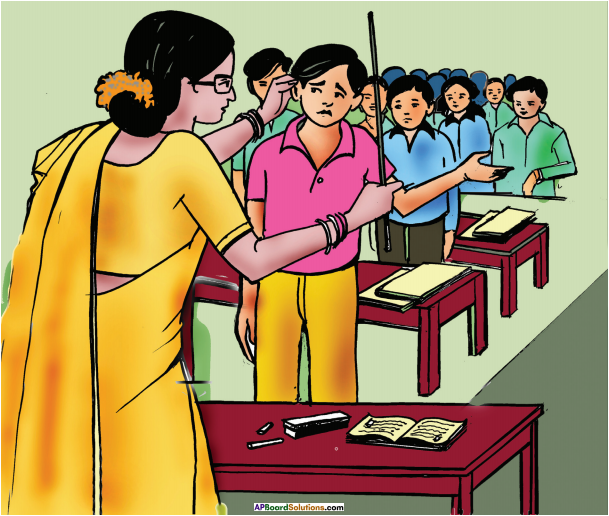
Question 1.
Why do you think the teacher is punishing that student?
Do you approve of this action of the teacher? Give at least one reason for your opinion.
Answer:
I think the teacher is punishing the student because he might cause nuisance. He might not finish his homework. He might be indisciplined in the class. I usually don’t approve this kind of action of the teacher because corporal punishment should not be initiated against children. It is common with the school children behaving improperly at their tender age. They don’t know the importance of education and how to behave. Teachers need great patience to change them.
![]()
Question 2.
Can you suggest a few steps to correct the students causing nuisance?
Answer:
Various different kinds of steps are at hand to correct erring students. Some of them are:
- explaining to them in the way they appreciate what is wrong with them and how they can be good.
- making them imagine that they are at the receiving end.
- making them realise the value of the fruits of being good.
- providing them with examples of bad behaviour ruining careers and lives.
- engaging them in productive activities of their choice.
- repeatedly attempting to understand their feelings, sentiments, and view points.
- giving them opportunities to express themselves, to lead, to organise, to suggest programmes and activities.
- ignoring their misdeeds and allowing and encouraging them to correct themselves.
- informing their parents about their positive qualities.
- encouraging them to participate in social service activities.
Comprehension
I. Answer the following questions.
Question 1.
Why do you think the headmaster entered the class with a flushed face and a hard ominous look?
Answer:
Swami and his friends had not attended the classes the previous day. Moreover they had broken the panes of ventilators of the headmaster’s room. The school peon saw that. And he Informed the headmaster. That was why the headmaster was very angry.
Question 2.
Why did the headmaster send for the peon?
Answer:
The headmaster sent for the peon. He wanted to show to the students the proof of their mischief. The peon was the witness to their wrong deeds.
![]()
Question 3.
“I don’t care for your dirty school.” Why did Swami mutter so?
Answer:
The headmaster went on beating Swami. Swami complained of severe pain. That Invited four more hits. Swami could no longer bear the pain. He was in a desperate situation, That made him bold. So he took his books and walked out of the class. He said he least cared for that dirty school,
Question 4.
Do you justify the headmaster’s behaviour? If not, state your reasons.
Answer:
No, I don’t justify the headmaster’s behaviour. Corporal punishment is not the correct way to correct the wrong doing. And continuous corporal punishment is the worst part of it. That only provokes revolt not remorse.
![]()
Question 5.
If you were in Swami’s place, how would you feel?
Answer:
If I were in Swami’s place, I would feel the same way as Swami did. But I doubt I would have broken the panes. And I am afraid I could have muttered as Swami did.
II. Here are some utterances from the story. Complete the table.
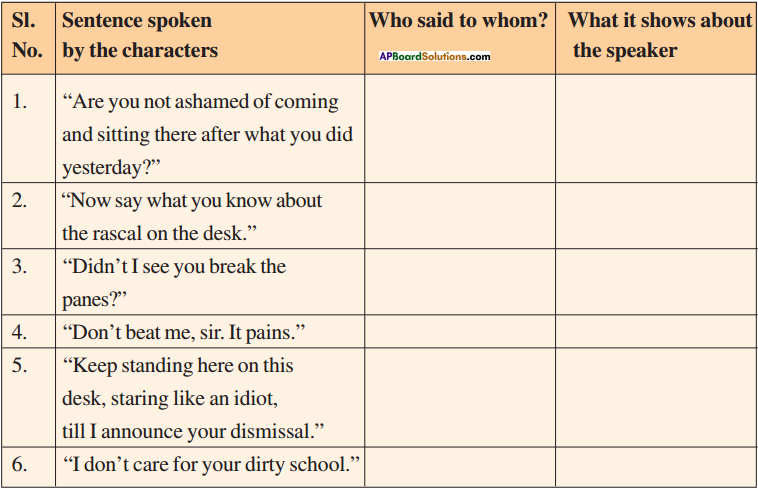
Answer:
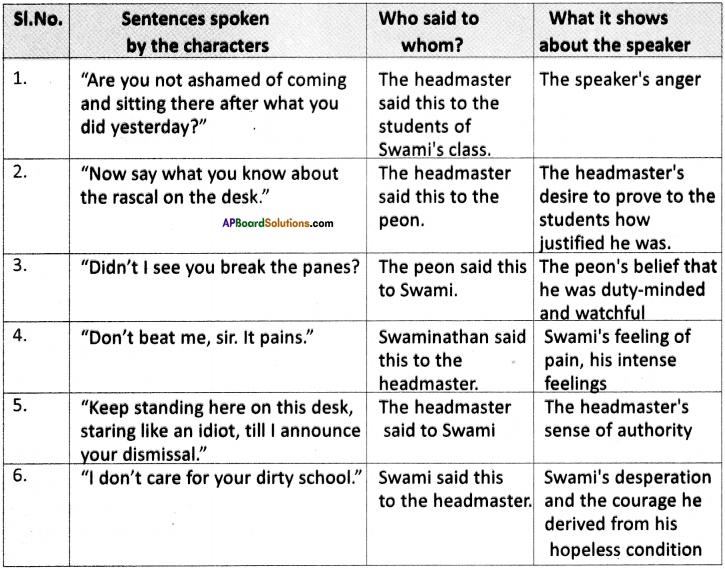
III. Work in Groups
Give reasons for Swami’s decision to leave the school:
1. ________________
2. ________________
3. ________________
Answer:
- Swami was unable to bear the pain of the cane any more.
- The headmaster had any how announced his dismissal.
- More than the physical pain, the insult was unbearable.
- In the desperation, Swami couldn’t think of any other alternative.
- Swami must have thought of joining another school.
Vocabulary
I. Pick out words from the story which are synonyms of the following words.
| Word | Synonyms |
| 1. beat | |
| 2. angry | |
| 3. rascal | |
| 4. humiliation |
Answer:
| Word | Synonyms |
| 1. beat | thrash, whack, rap |
| 2. angry | flushed ; furious |
| 3. rascal | loafer, idiot, cheat |
| 4. humiliation | insult |
II. Look at the following phrasal verbs taken from the text.
- keep away
- look around
- look at
- bring down
- cut off
These phrases are verbs followed by prepositions or adverbial particles. You may understand that they are phrasal verbs.
You will notice that the following phrasal verbs ‘keep away’, ‘bring down’ and ‘cut off’ can be split as shown below.
Examples:
- Keep the files away.
- Bring the patient down.
- Cut it off.
The other two phrasal verbs cannot be split.
Use the following phrasal verbs in your own sentences and decide whether you can split them as shown in the above examples.
| Phrasal Verbs | Sentences of your own |
| look up | |
| bring out | |
| throw out | |
| look out |
Answer:
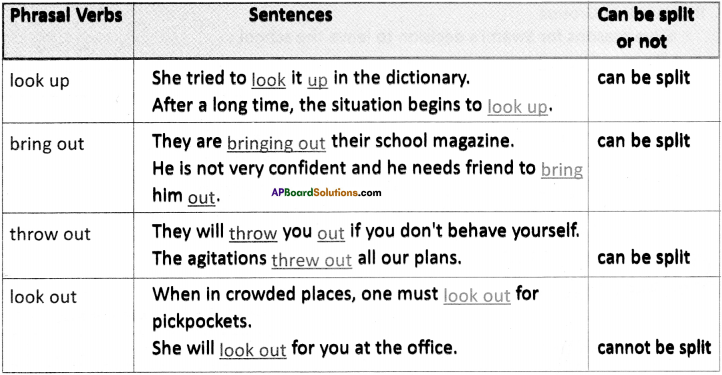
III. Refer to a dictionary and pick out the phrasal verbs that begin with the following verbs and write down sentences using them.
| Verbs | Phrasal verbs beginning with the verb |
| bring | |
| look | |
| rush | |
| keep | |
| go | |
| put |
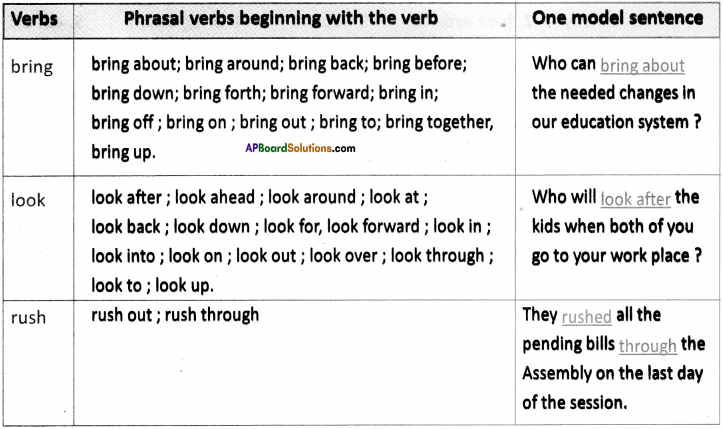
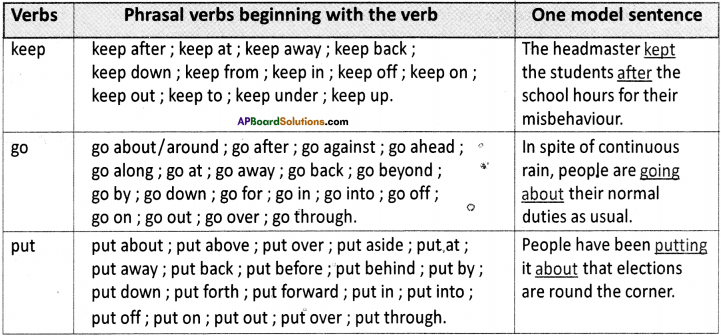
Grammar
I. Read the following imaginary conversation between Swami and the headmaster.
Headmaster : Why didn’t you come to school yesterday?
Swami : Sir, my mother was suffering from fever.
Headmaster : I don’t believe your words. You always say something or the other to escape from school.
Swami : I’m speaking the truth, sir.
Headmaster : Well, I’ll come to your house tomorrow and talk to your parents.
In the indirect speech, the above conversation can be written like this.
The headmaster asked Swami why he had not come to school the day before. Swami replied respectfully that his mother had been suffering from fever. The headmaster retorted that he did not believe his words and added that he always said something or the other to escape from school. Then Swami replied respectfully that he was speaking the truth. Then the headmaster told him that he would go to his house the next day and talk to his parents.
As you can see, while converting the direct speech into indirect speech, the words in the bold are added to express the feelings, emotions, attitudes of the speaker, and the sequences of the actions.
Read the imaginary conversation between Swami and his father:
Swami’s Father : My dear Swami, why are you looking so dull? Why haven’t you gone to school today?
Swami : Daddy, I don’t like the school. The headmaster beats me every day.
Swami’s Father : Why does your headmaster beat you every day without any reason? I’m sure you must be causing a lot of nuisance in school.
Swami : No, Dad. The headmaster beats all my friends in the same way.
Swami’s Father : OK. What do you want to do now? Don’t you go to school and continue your studies?
Swami : No, Dad. I’ll join some other school.
Now change the conversation into indirect speech.
Answer:
Swami’s father lovingly addressed his son and asked him why he was looking very dull. He further enquired why he had not gone to school that day. Swami replied with pain that he did not like the school and complained that the headmaster beat him everyday. Fatherdisbelievingly asked why the headmaster beat him every day without any reason. He added that he was sure Swami must be causing a lot of nuisance in school. Swami emphatically denied that and added that the headmaster beat all his friends in the same way. Father agreeingly asked what he wanted to do then. He further asked if he would not go to school and continue his studies. Swami replied that he would join some other school.
![]()
II. Noun Clause
Look at the sentences taken from the story.
1. One student said that he had an attack of a headache.
This sentence has two clauses.
a) One student said (Principal clause)
b) that he had an attack of a headache. (Subordinate clause)
The Subordinate clause is the object of the verb ‘said’. It is a noun clause. The noun clause can also appear in the subject position as can be seen in the following sentence.
2. What you say is not clear to me.
If we replace the underlined part with ‘it’ in the above sentence, the sentence structure will be complete.
Note: Sometimes the word ‘that'(conjunction) can be left out in spoken English.
e.g. He felt that punishment was not enough, (that- adjective)
Now read the following passage carefully and identify the noun clauses.
Replace the underlined words ‘that’, ‘so’, and ‘it’ with suitable noun clauses.
The headmaster entered the class furiously and said that he wanted to know the reason for the absence of some students in the class the day before. One student said that he had suffered from a severe headache. The headmaster said, “I don’t believe that”. The second said that somebody stopped him from coming to school. The headmaster said, “I don’t think so”. The third said that he too had suffered from a bad headache. On hearing that the headmaster shouted in anger. The fourth said that he had suffered from a terrible toothache. The headmaster said, “I don’t believe it”. The fifth said, “My grandmother died suddenly”. The headmaster retorted that he would ascertain it. He said, “I will come to your house tomorrow to know the fact.”
Answer:
A) Noun Clauses
- that he wanted to know the reason for the absence of some students in the class the day before.
- that he had suffered from a severe headache.
- that somebody stopped him from coming to school.
- that he too had suffered from a bad headache.
- that he had suffered from a terrible toothache.
- that he would ascertain it.
B) Replacing ’that1 ‘so1 and ‘it’ with suitable noun clauses.
- “I don’t believe that.” = “I don’t believethat you have suffered from a severe headache”.
- “I don’t thinkso” = “I don’t thinkthat somebody stopped you from coming to school”.
- “I don’t believe it.” = “I don’t believethat you have suffered from a terrible toothache.”
III. Editing
Read the following passage and edit (correct) the underlined parts.
Swami went home and says that the headmasterbeats him severely. The parents asked that why the headmaster had beaten him. Swami said that the headmaster beats him yesterday. Swami’s father said why the headmaster has beaten him without any cause. Swami replied to his father that the headmasterbeats him every day. Swami’s mother told to Swami to attend the classes regularly.
Answer:
Swami went home and said that the headmaster had beaten him severely. The par¬ents asked why the headmaster had beaten him. Swami said that the headmaster had beaten him the day before/the previous day. Swami’s father asked Swami why the head- master had beaten him without any cause. Swami repted that the headmaster beats him every day. Swami’s mother told Swami to attend the classes regularly.
Writing
I. What do you think Swami might have thought after he had left his school? Write down his reflections in a paragraph.
Answer:
Swami controlled his tears with a great effort. He came out of the school muttering “I don’t care for your dirty school.” As he came out he must have thought thus, “What a wretched school! How cruelty has taken the shape of this headmaster? Don’t they understand our feelings? Weren’t they too children at one time? Didn’t they cause any nuisance when they were children? Yes, I did break the panes in a moment of childish behaviour. Have I not been honest in not denying the charge? Is it not enough to scold us in the whole class? He went on insulting us, beating us, and threatening us with dismissals. Is that the way to correct us? Shouldn’t they give us a chance to set ourselves right? I wish I weren’t a student of this horrible school. Thank God! At least now, I gathered enough courage to come out of the school. I can join some other school. I think any other school will definitely be better than this bloody school. Anyhow, I too should and will be more careful about my behaviour and friends. I should think of my studies and my parents too. Yes, in one way, the incident is a lesson for me. I should make utmost use of it!
![]()
II. Construction of a Narrative
Look at the concluding part of the story.
He restrained the tears that were threatening to rush out, jumped down, and, grasp¬ing his books, rushed out, muttering, ‘I don’t care for your dirty school.’
Now imagine what happens to Swami after going away from school. Write a narrative which should include dialogues, sensory perceptions etc.
You may include things such as the following.
1) Swami rushed out from the class.
2) His parents asked him what happened at school.
3) His mother looked at the scars on his shoulders.
4) His father wanted him to go to school.
5) Swami did not like to go to school.
Answer:
Swami rushed out of the school saying, “I don’t care for your dirty school.” As he walked homewards, the tears that had been controlled till then found their way out. And they came out in floods. Swami didn’t mind them. His mind was swarmed with different kinds of thoughts. His heart ached with insult. His body burned with pain. His mind was hot with a heavy flow of thoughts. He did not notice passing persons. He didn’t even take care to walk to the left of the road. In fact, his legs took him along the regularly used path. At last, somehow he reached home with school bag on his back. The face with the marks of tears, the shoulders with the prints of the cane, and the heart, most importantly, with the load of insult and suffering!
Swami’s mother was moved on seeing Swami’s pathetic state. Her eyes turned wet as she saw the red scars on Swami’s shoulders. With choked throat, she asked Swami what had happened. Even the anxious father eagerly looked forward to listening to Swami. His parents’ anxiety touched Swami. He tried to be as cool as possible. He started narrating the incident at school very briefly.
“Our headmaster beats me everyday. For one reason or the other, he scolds me, and that too in a foul way. He repeatedly warns me with dire consequences.” As he continued, it became difficult for him to control his tears. Still, he tried to suppress the sobs and paused for a while. Father took that opportunity to ask, “Why does your headmaster beat you alone everyday without any reason ?”
That question hit Swami’s heart like an arrow. Yet he restrained his feelings and said in an emotion filled voice, “Dad, he beats everyone, not me alone; that is his nature, his hobby, his practice. You can check it with any of our school students. The only difference is on the days of visits by officers or village elders.”
“Then,” interrupted mother with concern, “What shall we do ?” “I shall join some other school,” prompt was the reply from Swami lest Father should announce a different decision.
Noticing the resolute voice of Swami, even father wanted Swami’s words to prevail. Mother was too willing. She sighed in relief as there was no opposition from father. Swami started dreaming of his new school!
Study Skills
I. Read the data given in the table and answer the questions that follow.
Reasons for Dropouts among children Aged 5-14 Years – 1997-98
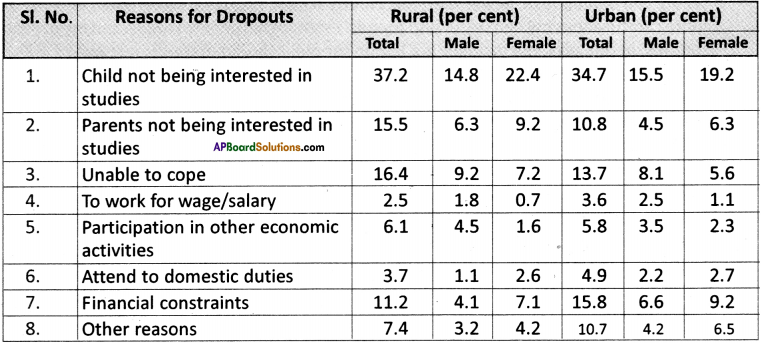
Source: Ministry of Human Resource Development (MHRD)
Answer the following questions:
1. What is the major reason for dropouts in rural and urban areas?
2. What percentage of female children are dropped out as their parents not being interested in their children’s studies in rural areas?
3. Which is the less significant reason for dropouts?
4. Which of the following statements are true with reference to the data given in the above table? Tick (S) the true statements.
a. The dropout-rate due to child not being interested in studies is more among the urban children than that of the rural children.
b. Participation in other economic activities is high among urban female children when compared with rural female children.
c. If we create interest in studies among the children, the literacy rate will increase in our country.
Answer:
- The major reason for dropouts among children both in rural and urban areas is the child being not interested in studies.
- 9.2 percent of girls are dropouts in rural areas because of lack of interest on the part of parents.
- Working for wages/salaries is the least significant reason for dropouts.
- a – ✗ b – ✓ c – ✓
![]()
II. Write a report on dropouts using the information given in the above table.
You may begin the report like this.
This report is based on the data provided by MHRDfor the year 1997-98for children who dropped out in the age group of 5-14 years…
Include the following.
1. The financial reasons for dropouts
2. Personal reasons for the dropouts
3. Whether the dropout rate is more among girls/boys
4. Whether the dropout rate is more among rural/urban
Answer:
This is a report on dropout rates among children aged between 5 -14. The information comes from the survey conducted by the Ministery of Human Resource Development (MHRD) for the year 1997-1998. Both the rural and urban areas (separately) were taken into consideration and the data categorises male and female children separately. Dropout rate caused by lack of interest on the part of the child tops the list with 37.2% in rural areas and 34.7% in urban areas. Working for wages is the least significant reason with just 2.5% in villages and 3.6% in towns. Dropout rate among girls is more than that of the boys by 10% in rural areas and by about 6% in urban areas. Economic, social, personal, and other reasons contribute for this undesirable state of affairs.
Listening
Practise listening carefully. Then you will be able to speak.
Listen to the 2 speeches and answer the questions that follow.
Speeches!
Speech 1
Good evening to all the people present here today. It’s a pleasure to start this occasion by welcoming everybody. I welcome our headmaster to preside over the function. Now I would like to invite the honourable chief guest, our M.L.A to come onto the dais. I welcome my teachers, my fellow – friends, and schoolmates. Today we all have gathered here for the Annual Day celebration. I welcome you all and I hope you enjoy the programme.
Now I request our headmaster to start the function.
Thank you.
Speech 2 :
I have a great pleasure in welcoming our principal to preside over the Children’s Day programme that we have today. It is a great privilege for me to invite our chief guest, the D.E.O. of our district, who has kindly consented to be the chief guest for the day, I also welcome other distinguished guests, who also have consented to be with us today despite their tight schedule. I cordially welcome my colleagues and non-teaching staff too. In today’s celebration our main heroes are our students. So I welcome them and their parents too along with all others.
I hope you enjoy every aspect of this event and request the president to begin the proceedings.
Thank you.
Now answer the following questions:
1. Who is the speaker of speech 1?
Answer:
A student is the speaker of speech 1.
2. What is the occasion mentioned in the first speech?
Answer:
The occasion is Annual Day celebration. (1st speech)
3. What is the occasion mentioned in the second speech?
Answer:
The occasion is Children’s Day programme. (2nd speech)
4. Who is the chief guest mentioned in the second speech?
Answer:
The D.E.O of the district is the chief guest. (2nd speech)
5. Who is addressing the gathering in the second speech?
Answer:
A teacher is addressing the gathering. (2nd speech)
Oral Activity
Imagine that you are the School Pupils’ Leader (SPL). Compere on the Republic Day celebrations in your school.
You may include the following in your speech :
1) Welcome address
2) Inviting the guests onto the dais
3) Importance of the occasion
4) Request to continue the proceedings
Answer:
A brilliant morning to every soul gracing the grand occasion of our Republic Day celebrations. A noble national festival and our patriotic feelings have brought us all together here. On this memorable event, I extend my warm welcome to you all and the greetings of the day too. Now I invite our honourable headmaster to come over to the dais to preside over the proceedings. I feel it my privilege and pleasure to invite our distinguished guest of the day, our beloved collector on to the dais. Let us all extend our thunderous applause as our collector comes to grace the occasion. It is my pleasure to invite on to the dais our dear teachers who have won our hearts with their excellent teaching skills and touching attitude.
Now my dear fellow students, parents, and guests let us cherish each moment of the programmes it gradually unfolds, majestically moves ahead, and colourfully culminates. May I now request the president of the programme to lead the proceedings.
Thank you one and all.
Swami is Expelled from School Summary in English
Rasipuram Krishnaswamy Narayan’s novel Swami and Friends is an interesting story of Swami. The present part deals with one incident in Swami’s school life. One day Swami and his friends did not attend classes. Moreover, they broke the window panes of the Headmaster’s room. The peon saw that act. The following day the headmaster entered Swami’s class with a cane and a furious face. He started scolding them. He also demanded every one to explain to him why they had been absent the previous day. When they cooked up some stories, he asked for proof. He used the cane, asked them to stand up on their benches, announced suspension, etc. When it was the turn of Swami, he had no stories to tell the headmaster. His silence added insult to the headmaster’s injury. He went on beating Swami on the shoulders, the back with his cane. Swami’s complaints of pain made the headmaster more violent. Not able to bear the torture any more, Swami left the class
Swami is Expelled from School Glossary
ominous (adj) : indicating the happening of bad
but (preposition) (here) : except
eminence (n) : fame, respect
loafer(n) : a person who wastes time without working
ascertain (v) : find to be true or not
pause(n) : a short stop ; gap
knuckles (n-plural-the first ‘k’ silent : joints in fingers
(Note : The ‘k’ at the beginning of a word followed by ‘n’ is silent, e.g. : know, knife, knight)
resolutely (adv) : with a strong decision
gazing (v-ing) : looking
intently (adv) : with all attention
acute (adj) : intense
rap (n) : a sharp hit
gaol(n) : jail, prison
discreet (adj) : careful; tactful
stammered (v-past tense) : spoke with difficulty ; repeating sounds
thrash (v) : hit, beat
sinister (adj) : evil, dangerous
![]()
grunted (v-past tense) : made short, low sounds in the throat to show Irritation
ventilators (n-plural) : window like arrangements close to the ceiling
zest (n) : enthusiasm
whack (n) : a hit
brigand (n) : a member of a group of criminals
defiant (adj) : refusing to obey
deny (v) : to refuse to admit
charge (n) : accusation
ejaculated (v-past tense) : shouted suddenly
staring (v+ing) : looking
idiot (n) : a stupid person ; a fool
desperation (n) : hopeless condition
restrained (v – past tense) : controlled
muttering (v + ing) : saying in a low voice